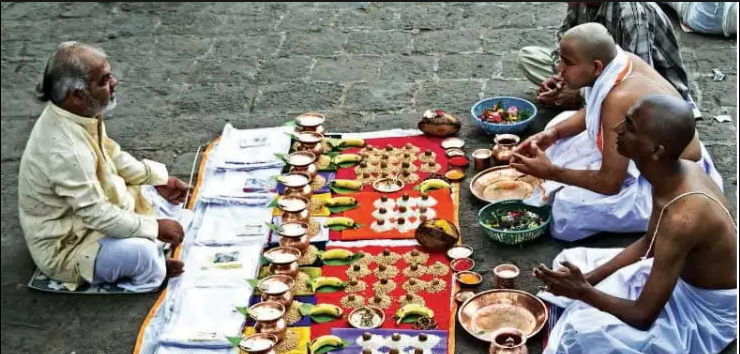- This topic has 0 replies, 1 voice, and was last updated by .
-
AuthorPosts
-
September 30, 2023 at 10:47 pm #1432Up::2
Significance of Shradh
According to Hindu mythology, after the death of a person, it’s soul will move among multiple worlds. During Pitra Paksha, Shraddha is a ritual that is used to bring peace to ancestral relatives who have passed away. Repaying debts to the ancestors is part of a ritual. The significance of “Shraddha” is thoroughly explained in Hindu scriptures like the Agni Puran, Garuda Puran, Vayu Puran, etc. Shraddha, originally a Sanskrit word, it is a combination of the words Sat, which means truth, and Adhar, which means a regular basis. As a result, it refers to anything or something that is done in good faith and honesty. “Shraddhyaa Kriyate Yaa Saa” means that shradh is the ritual performed for the benefit of a person’s ancestors. Through this ritual, one can show their ancestors their complete respect.

Origin of Shradh
According to Hindu scriptures, Rishi Atri, one of Lord Brahma’s ten sons, was the first to understand the Shraddha rituals that he had learned from his son Nimi Rishi. Experiencing in the unexpected death of his son, Nimi Rishi started to invoke his ancestors in the guidance of Narad Muni. They soon appeared in front of him and informed him that his son had already taken his place among the Pitra Devas. It is exactly the same as if you performed the Pitri Yajna because you finished the act of feeding and worshipping the soul of your passed away son. Since that time, the Shradh has been regarded as a crucial Sanatan Dharma ritual.

Do’s and Dont’s in Shradh.
On the lunar tithi of their passing, the ancestors’ shradh is carried out. However, there are a few exceptions to this rule:
Pratipada Shradh is additionally considered to be more ideal for performing Shraddha for maternal Nana-Nani (grandfather and grandmother).
For those who passed away in the previous year, the fourth day, known as Chautha Bharani, and the fifth day, known as Bharani Panchmi, are set aside.
Additionally, Panchami Shradh is thought to be appropriate for performing Shradh for departed unmarried family members.
Additionally, Shradh for married women who passed away prior to their husbands is thought to be appropriate for Avidha Navami. It is also referred to as Matrinavami and is appropriate to perform Shradh of one’s mother.
Src- Vayu Purana, Veducation Library.
Attachments:
You must be logged in to view attached files. -
AuthorPosts
- You must be logged in to reply to this topic.